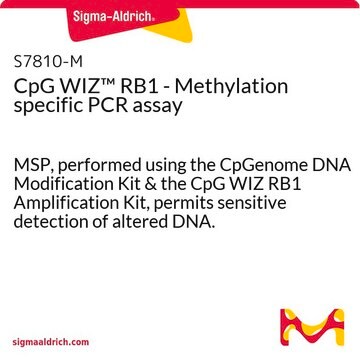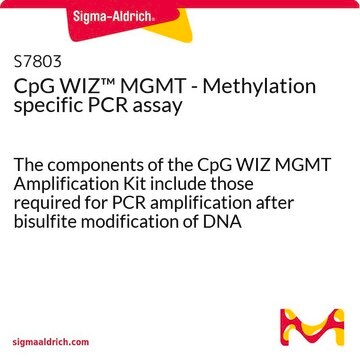S7830
CpG WIZ™ BRCA1 -Methylation specific PCR assay
Methylation-specific PCR (MSP), performed using the CpGenome DNA Modification Kit & the CpG WIZ BRCA1 Amplification Kit, permits sensitive detection of altered DNA.
About This Item
Recommended Products
Quality Level
species reactivity
human
manufacturer/tradename
CPGWIZ™
Chemicon®
technique(s)
PCR: suitable
NCBI accession no.
UniProt accession no.
application(s)
genomic analysis
shipped in
dry ice
Gene Information
human ... BRCA1(672)
General description
Previously developed methods to determine the methylation status of cytosine include digestion with methylation sensitive restriction enzymes and genomic DNA sequencing. Both techniques have limitations: restriction enzymes can only detect methylation sites within their recognition sequence and sequencing is time consuming. Increasing the detection sensitivity of CpG island methylation has the potential to define tumor suppressor gene function and provides a new strategy for early tumor detection.
Methylation-specific PCR (MSP) is a new technology for sensitive detection of abnormal gene methylation utilizing small amounts of DNA (4). This process employs an initial bisulfite reaction to modify the DNA, followed by PCR amplification with specific primers designed to distinguish methylated from unmethylated DNA. The CpGenome DNA Modification Kit (Cat. No. S7820) contains the reagents necessary to perform the initial bisulfite reactions, while the CpG WIZ BRCA1 Amplification Kit contains the reagents required for the PCR amplification reactions.
Methylation-specific PCR (MSP), performed using the CpGenome DNA Modification Kit and the CpG WIZ BRCA1 Amplification Kit, permits sensitive detection of altered DNA. Because this is a PCR-based assay, it is extremely sensitive, facilitating the detection of low numbers of methylated alleles and the study of samples containing small amounts of DNA. MSP also allows examination of all CpG sites, not just those with BRCA1 sequences recognized by methylation sensitive restriction enzymes. Increasing the number of such sites that can be assessed allows rapid, fine mapping of methylation patterns throughout CpG regions. In addition, the bisulfite modification is ideally suited for analysis of CpG islands since it converts the majority of cytosines to uracils, making a region of the genome that is CG-rich less difficult to amplify by PCR.
MSP employs an initial bisulfite reaction to modify the DNA, followed by a "hot start" PCR amplification with specific primers designed to distinguish methylated DNA from unmethylated DNA. As shown in Figure 1, in the bisulfite reaction, all unmethylated cytosines are converted to uracils while 5-methylcytosines remain unaltered. Thus, the sequence of the treated DNA will differ if the DNA is originally methylated vs. unmethylated. Primers contained in the CpG WIZ BRCA1 Amplification Kit are designed to specifically amplify each of the sequences based upon these chemically-induced differences. If the sample DNA was originally unmethylated, a product will be generated after PCR using the U primer set. Conversely, a product will be generated using the M primer set if the sample was originally methylated.
Application
Components
U Primer Set7.5 μM each primer (25X) / 35 μL (clear cap) / 90645 / -15°C to -25°C
M Primer Set7.5 μM each primer (25X) / 35 μL (red cap) / 90646 / -15°C to -25°C
W Primer Set7.5 μM each primer (25X) / 35 μL (green cap) / 90647 / -15°C to -25°C
U control DNA0.1 μg/μL / 50 μL (clear cap) / 90393 / -15°C to -25°C
M control DNA0.1 μg/μL / 50 μL (red cap) / 90394 / -15°C to -25°C
W control DNA0.05 μg/μL / 50 μL (green cap) / 90395 / -15°C to -25°C
Universal 10X PCR Buffer / 265 μL (blue cap) / 90396 / -15°C to -25°C
Legal Information
Disclaimer
Storage Class Code
10 - Combustible liquids
Regulatory Listings
Regulatory Listings are mainly provided for chemical products. Only limited information can be provided here for non-chemical products. No entry means none of the components are listed. It is the user’s obligation to ensure the safe and legal use of the product.
JAN Code
S7830:
Certificates of Analysis (COA)
Search for Certificates of Analysis (COA) by entering the products Lot/Batch Number. Lot and Batch Numbers can be found on a product’s label following the words ‘Lot’ or ‘Batch’.
Already Own This Product?
Find documentation for the products that you have recently purchased in the Document Library.
Our team of scientists has experience in all areas of research including Life Science, Material Science, Chemical Synthesis, Chromatography, Analytical and many others.
Contact Technical Service








